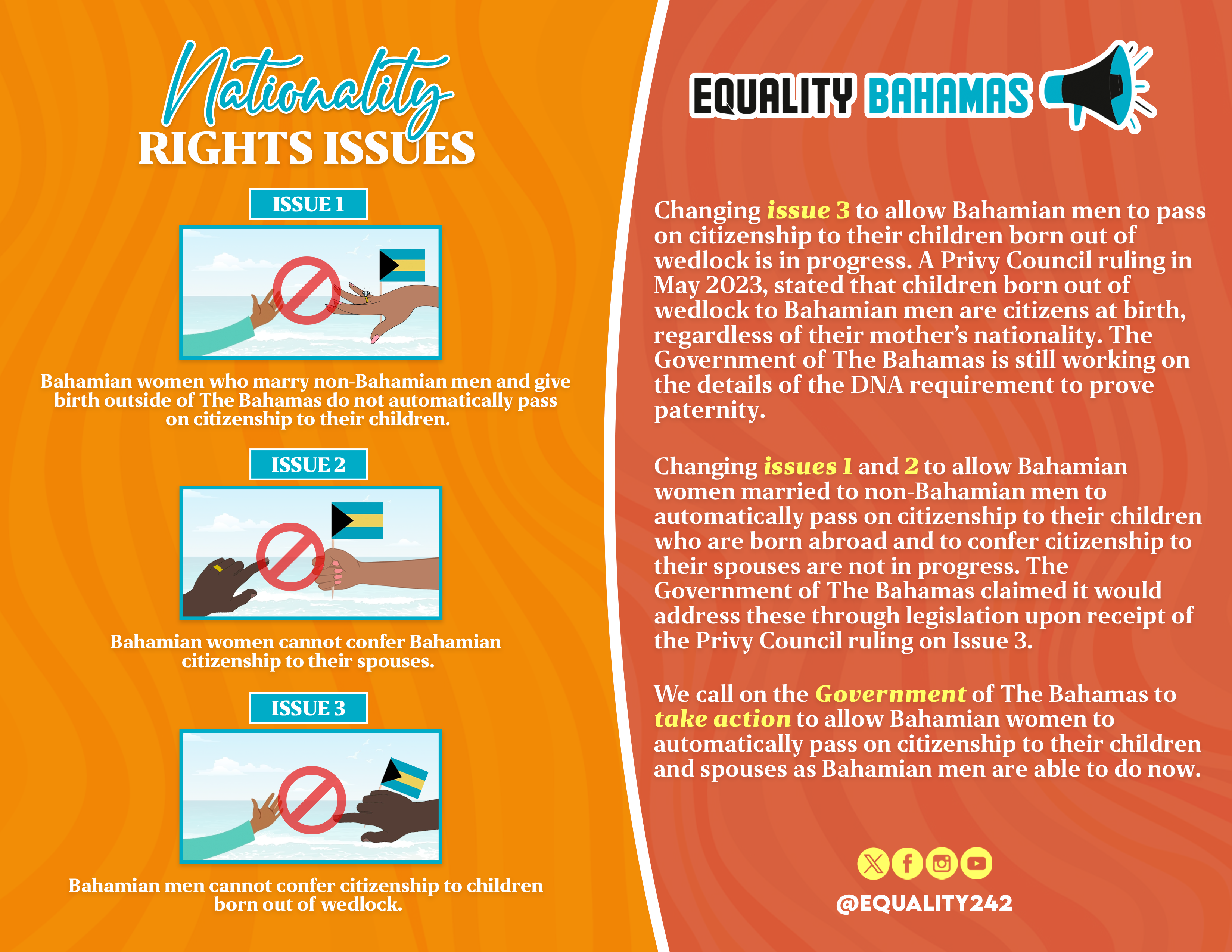Gender inequality in nationality rights is enshrined in the constitution of The Bahamas. Bahamian women who marry non-Bahamian men and give birth abroad are not able to automatically confer citizenship on their children. Bahamian women are also not able to confer citizenship on their spouses. Bahamian men who have children out of wedlock are not able to confer citizenship on their children who are considered, by law, to be “fatherless.”
In 2014, then Prime Minister Perry Christie announced that a constitutional referendum would be held in an effort to address these three issues (in addition to the issue of sex-based discrimination). In order to change the constitution, there must be a ⅔ vote in the lower and upper houses and a 50% plus one vote in a referendum. In 2016, the referendum was held and 66.66% of participating voters voted against making the constitutional amendments for gender-equal nationality rights.
What does the constitution say?
Article 8:
“A person born outside The Bahamas after 9th July 1973 shall become a citizen of The Bahamas at the date of his birth if at that date his father is a citizen of The Bahamas otherwise than by virtue of this Article or Article 3(2) of this Constitution.”
This means Bahamian women cannot automatically pass on Bahamian citizenship to their children. Instead, their children may apply between the ages of 18 and 21, and the outcome is at the discretion of a government official. Bahamian men married to non-Bahamian women, however, automatically pass on citizenship to their children regardless of where their children are born.
Article 10:
“Any woman who, after 9th July 1973, marries a person who is or become a citizen of The Bahamas shall be entitled, provided she is still so married, upon making application in such manner as may be prescribed and upon taking the oath of allegiance or such declaration as may be prescribed, to be registered as a citizen of The Bahamas:
Provided that the right to be registered as a citizen of The Bahamas under this Article shall be subject to such exceptions or qualifications as may be prescribed in the interest of national security or public policy.”
This means Bahamian women cannot confer Bahamian citizenship on their spouses while Bahamian men can. The non-Bahamian spouses of Bahamian women do not have the right to apply for citizenship by way of marriage.
Article 14:
“(1) Any reference to the father of a person shall, in relation to any person born out of wedlock other than a person legitimated before 10th July 1973, be construed as a reference to the mother of that person.
(2) For the purposes of this Chapter, a person born aboard a registered ship or aircraft, or aboard an unregistered ship or aircraft of the government of any country, shall be deemed to have been born in the place in which the ship or aircraft was registered or, as the case may be, in that country.
(3) Any reference in this Chapter to the national status of the father of a person at the time of that person’s birth, shall, in relation to a person born after the death of the father, be construed as a reference to the national status of the father at the time of the father’s death and where that death occurred before 10th July 1973 and the birth occurred after 9th July 1973 the national status that the father would have had if he had died on 10th July 1973 shall be deemed to be his national status at the time of his death.”
This means that Bahamian men cannot pass on citizenship to their children who are born outside of marriage to a non-Bahamian woman.
WHAT HAVE INTERNATIONAL MECHANISMS SAID ABOUT THIS?
During the fourth cycle of the United Nations Universal Periodic Review in 2023, several member states issued recommendations to The Bahamas on the issue of Nationality Rights. Cuba, Cyprus, Germany, Jamaica, Lithuania, Mexico, Uruguay, The Netherlands, and The United States of America all made specific recommendations to our government.
In November 2018, the United Nations Convention on the Elimination of All Forms of Discrimination against Women (CEDAW) Committee said:
“The Committee notes the State party’s announcement, in November 2017, to amend the Bahamas Nationality Act in order to ensure that Bahamian women have the same rights as Bahamian men regarding the transmission of their nationality to their children. It regrets, however, the failure of the referendums held in 2012 and 2016 to change the Constitution to enable Bahamian women to pass on their nationality to their children on an equal basis with men. The Committee is also concerned that children who are stateless in the Bahamas, including orphans of parents who are themselves stateless or of unknown nationality, cannot apply the principle of ius sanguinis or that of ius soli to obtain nationality, and about a lack of information or statistics on stateless women and girls in the State party.”
They also recommended amendments to The Bahamas Nationality Act 1973:
“Amend the Bahamas Nationality Act 1973 to include provisions allowing Bahamian men and women to transmit citizenship to their children on an equal basis and take further legislative steps to ensure that Bahamian women can transmit their nationality to non-Bahamian spouses, in line with article 9 of the Convention.”
The CEDAW Committee also recommended:
“Ensure, without delay, that a comprehensive review of existing legislation is conducted, that a comprehensive definition of discrimination against women is put forward, in line with the Convention, and that the principle of gender equality is integrated into all national laws.”
What do we demand?
- Article 8 needs to be amended to allow Bahamian women who are married to Bahamian men and give birth outside of The Bahamas to pass on citizenship to their children. It needs to be amended to say “his father or mother”.
- Article 10 needs to be amended to allow Bahamian women to pass on citizenship to their non-Bahamian spouses. It needs to be amended to say “Any person who”.
- Article 14 needs to be amended to allow Bahamian men to pass on citizenship to their children who are born outside of marriage. It needs to be amended to say “A reference in this Chapter to the father of a person born out of wedlock after the coming into operation of this paragraph, means a male who satisfies any requirements as to proof of paternity as may be prescribed.”
We call on the Government of The Bahamas to:
- Immediately address the issue of gender inequality in nationality rights through amendments to The Bahamas Nationality Act while recognizing it is not sufficient and constitutional reform is required.
- Set a timeline and action plan for a constitutional referendum.
- Commit, as political parties, to holding a constitutional referendum 12-18 months following the next general election.
- Allocate adequate resources for a national education campaign on nationality rights, gender equality, and referenda to run for a minimum of two years before the constitutional referendum..
Resources
Learn more about the issues:
Just click image and then save to your device.

